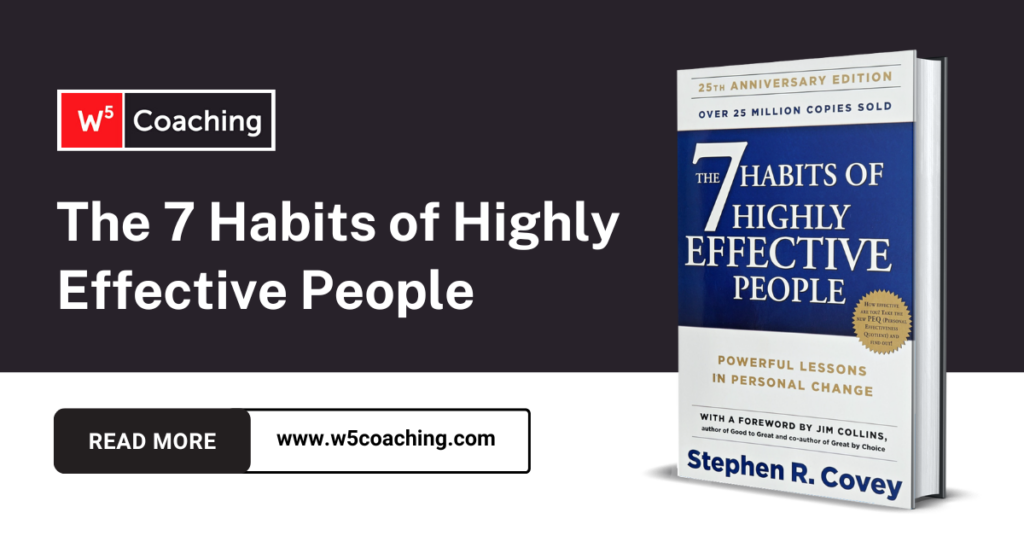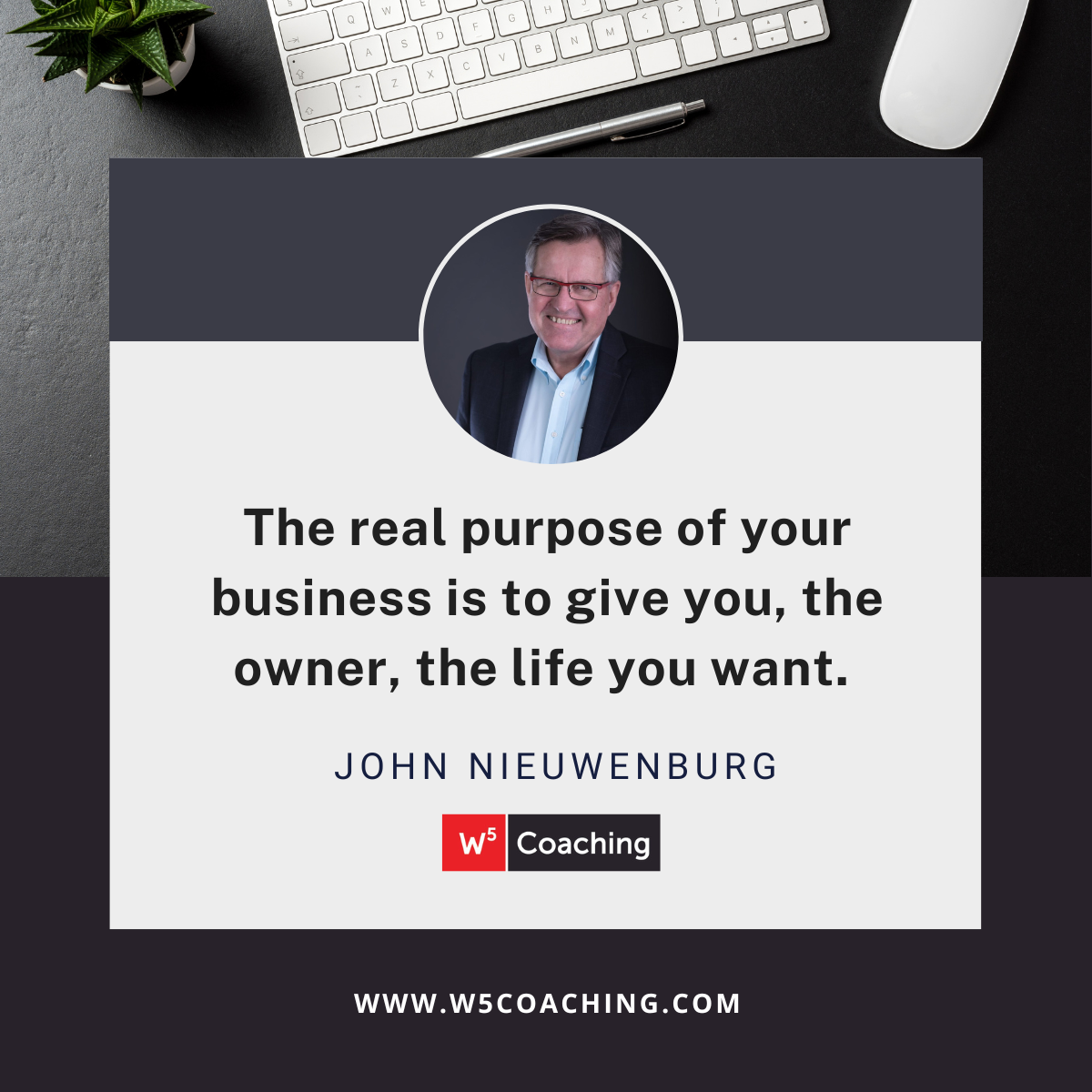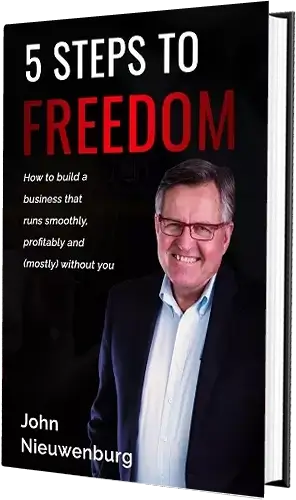Key Concepts: 7 Habits of Highly Effective People

One of my top recommendations on my list of books that every business owner should read is Steven Covey’s classic – the 7 Habits of Highly Effective People.
Here is a quick summary of the 7 habits along with some specific suggestions to apply them to make your business better.
1. Be proactive
 This means taking responsibility for your own life and not blaming external circumstances or other people for your problems. Instead, you should focus on finding solutions and taking action to achieve your goals.
This means taking responsibility for your own life and not blaming external circumstances or other people for your problems. Instead, you should focus on finding solutions and taking action to achieve your goals.
By taking ownership of your business and proactively seeking out solutions to challenges and opportunities, you can increase your chances of achieving your goals.
Try using these words: I choose, I prefer, I will.
- Be a solution to problems, not the problems themselves
- Do more than what is expected – anticipate needs and underlying concern
- When presenting information – give an analysis and recommendations based on the analysis
2. Begin with the end in mind
This means setting clear goals and developing a plan to achieve them.
When humans create, we do so 3 times:
- First, we create in our imagination
- Next, we create a representation, like a blueprint or map (AKA, the plan)
- Finally, we manifest and make it happen for real
By setting clear and specific business goals and developing a plan to achieve them, you can create a sense of purpose and direction for your business.
3. Put first things first
When you put first things first, you prioritize your activities and focus on what is most important to you. By prioritizing your business activities and focusing on what is most important, you can be more productive and efficient in reaching your goals.
The best place to start with this habit is to conduct a time audit and develop a default diary.
From there, you can become a master of delegation.
Stewardship delegation is focused on results instead of methods, which gives choice and responsibility. I call this executive leadership.
4. Think win-win
Win-win is a frame of mind and heart that constantly seeks mutual benefit in all human interactions. It’s not your way or my way, it’s a better way, a higher way.
Seek out mutually beneficial solutions in relationships and situations rather than trying to win at the expense of others.
By adopting a win-win mindset, you can create lasting, positive relationships with clients, partners, and employees who can help your business succeed.
5. Seek first to understand, then to be understood
This means listening actively and empathetically to others, trying to understand their perspective and needs before expressing your own. By demonstrating understanding and empathy, you can build trust and establish better communication with others.
Empathic listening gets inside another person’s frame of reference. You rephrase the content and reflect the feelings.
The key is to genuinely seek the welfare of the individual, to listen with empathy, to let the person get to the problem and the solution at their own pace and time.
By actively listening to and understanding the needs of your customers, you can create products or services that better meet their needs and increase the chances of achieving your business goals.
6. Synergize
To synergize is to work effectively with others to create something greater than the sum of its parts. By collaborating with others and valuing diversity, you can create innovative solutions and achieve results that could not be achieved alone.
When you communicate synergistically, you are opening your mind to new possibilities, new alternatives, new options.
The more authentic you become, the more genuine in your expression, particularly regarding personal experiences and even self-doubts, the more people can relate to your expression and the safer it makes them feel to express themselves. Valuing differences leads to better teamwork.
7. Sharpen the saw
This means taking care of your physical, mental, emotional, and spiritual well-being in order to maintain balance and effectiveness in your life. By regularly investing in your own development, you can sustain your energy and effectiveness over the long term.
Balanced self-renewal:
- Spiritual (value clarification, commitment, study and meditations)
- Mental (reading, visualizing, planning, writing)
- Physical (exercise, nutrition, stress management)
- Social/emotional (service, empathy, synergy, intrinsic security)
In an organization, the physical dimension is expressed in economic terms.
The mental or psychological dimensions deals with the recognition, development, and the use of talent.
The social/emotional dimensions has to do with the human relations, with how people are treated.
And the spiritual dimension deals with finding meaning through purpose and through organizational integrity.
Here are some of my personal take-aways and favourite quotes from the book
Self-mastery and self-discipline are the foundation of good relationships with others.
Six major emotional deposits: understand the individual, attend to the little things, keep commitments, clarify expectations, show personal integrity, and apologize sincerely when you make a withdrawal.
“Sow a thought, reap an action, sow an action; reap a habit; sow a habit, reap a character; sow a character, reap a destiny.”
Habit is the intersection to knowledge (what to do), skill (how to do) and desire (want to do)
“Management is doing things right; leadership is doing the right things.”
“Things which matter most must never be at the mercy of things which matter least.” ~ Goethe
Think effectiveness with people and efficiency with things.
“We seek not to imitate the masters, rather we seek what they sought.”
In summary…
The 7 Habits of Highly Effective People is a comprehensive guide to personal and professional development that can help individuals improve their effectiveness, achieve their goals, and create a more fulfilling life.
Covey’s habits are based on timeless principles and are applicable to people of all ages and backgrounds.
By incorporating these habits into your daily life (and business!), you can become more effective, achieve greater success, and live a more fulfilling and meaningful life.
If you resonate with the 7 Habits and see how adopting them could transform your business, you’re probably a good candidate for business coaching.
Interested? Book 15 minutes on my calendar here: time with John and we’ll have a win-win conversation.

Build a Self-Managing Company
How to build a business that runs smoothly, profitably, and (mostly) without you.
Feeling stressed out and overwhelmed with a business that is taking all your time - and not giving you enough in return?
Are you finding it challenging to hire the right team (and get them to do the right things)?
I wrote this little guide for you!
Enter your details below to receive your free copy!
